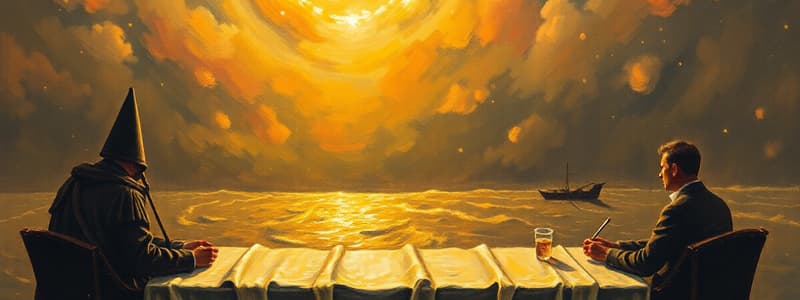Podcast
Questions and Answers
What is a significant concern regarding the use of nuclear weapons in the current global political climate?
What is a significant concern regarding the use of nuclear weapons in the current global political climate?
- The modernization of nuclear weapons is slowing down considerably.
- Major powers are likely to abandon their nuclear arsenals in the future.
- Promises not to use nuclear weapons are often viewed as unreliable. (correct)
- The balance of power is shifting solely due to economic factors.
Which factor is seen as contributing to the potential for nuclear conflict according to the content?
Which factor is seen as contributing to the potential for nuclear conflict according to the content?
- The abandonment of arms control treaties.
- The rise of outdoor nuclear testing facilities.
- An increase in diplomatic negotiations between competing powers.
- Technological innovations like social media and AI. (correct)
How does Cynthia Roberts describe the current role of nuclear weapons in international politics?
How does Cynthia Roberts describe the current role of nuclear weapons in international politics?
- They remain a lesser concern compared to economic strategies.
- They are now considered irrelevant to modern conflicts.
- They have regained central importance amid renewed great power competition. (correct)
- They are solely for deterrence and not for active military engagement.
What does the U.S. nuclear posture review warn about the current era?
What does the U.S. nuclear posture review warn about the current era?
What outcome is predicted by observers regarding the current geopolitical tensions?
What outcome is predicted by observers regarding the current geopolitical tensions?
Flashcards
Nuclear War Risk
Nuclear War Risk
The possibility of a large-scale global conflict using nuclear weapons, driven by competition and recklessness.
Nuclear Weapons Competition
Nuclear Weapons Competition
Renewed rivalry among major powers concerning nuclear weapons and their use.
Illiberal Regimes
Illiberal Regimes
Governments that prioritize their own interests and power over democratic principles and international laws.
Rise of China
Rise of China
Signup and view all the flashcards
Technological Advancements
Technological Advancements
Signup and view all the flashcards
Study Notes
Nuclear War Risk in Contemporary Conflicts
- Renewed great power competition has resurrected nuclear war as a major concern.
- Experts question the validity of leaders' promises not to use nuclear weapons.
- Western analysts worry about eroding taboos against nuclear use, particularly with Russia's invasion of Ukraine.
- The uncertainty of nuclear weapon use in the future is the only certainty for many experts.
Factors Increasing Nuclear Risk
- Rising illiberalism in global politics (like Russia's aggression).
- Competition between the US, Russia, and China.
- Emergence of 21st-century technologies (social media, AI) are weakening reason and increasing the risk of nuclear escalation.
- Decline of reason is making nuclear threats more likely.
Leaders, Decisions, and Potential Escalation
- Experts, like Stephen Van Evera, suggest that world leaders are often unreliable ("Liars rule the world").
- Russia's President Putin's invasion of Ukraine and potential nuclear weapon use, and recent withdrawal from the New START treaty, heighten the risk.
- Putin's anticipated easier victory in Ukraine was inaccurate; Russia is experiencing significant military setbacks.
- Putin's options include using tactical nuclear weapons as a bargaining chip, if facing a major setback like possible loss of Crimea.
- Putin hasn't faced catastrophic loss yet.
Expert Opinions and Predictions
- Cynthia Roberts (Hunter College) emphasizes the central role of nuclear weapons in modern politics.
- Scott Sagan (Stanford) points to the potential for reckless decisions by leaders on the brink of defeat.
- Charles Glaser (George Washington) suggests the possibility of rational uses of nuclear weapons despite the dangers, e.g., if Putin fears a monumental loss.
- Stephen Van Evera (MIT) is concerned about a US-Russia nuclear conflict.
- The balance of determination (resolve) between US and Russia is critical for the outcome.
- A consensus among experts suggests a massive conventional US retaliation in the event of a Russian nuclear attack, to mitigate escalation risk.
- Ethel Sullingen (political science professor) confirms the prevailing concerns.
Conclusion
- Experts widely believe a nuclear conflict is a growing possibility, due to renewed great power competition and the actions of unpredictable leaders.
- Technological advancements and declining reason are contributing factors.
- The potential for a nuclear escalation in Ukraine remains a major concern.
Studying That Suits You
Use AI to generate personalized quizzes and flashcards to suit your learning preferences.




